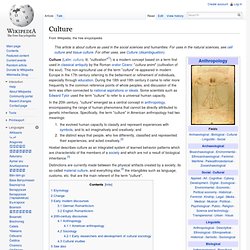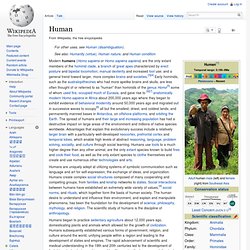

Art, Music, and Literature. Religion and Spirituality. Trade and Economics. Society. A society , or a human society , is a group of people related to each other through persistent relations, or a large social grouping sharing the same geographical or virtual territory, subject to the same political authority and dominant cultural expectations. Human societies are characterized by patterns of relationships ( social relations ) between individuals who share a distinctive culture and institutions ; a given society may be described as the sum total of such relationships among its constituent members. In the social sciences , a larger society often evinces stratification and/or dominance patterns in subgroups. Insofar as it is collaborative , a society can enable its members to benefit in ways that would not otherwise be possible on an individual basis; both individual and social (common) benefits can thus be distinguished, or in many cases found to overlap.
Culture. Culture (Latin: cultura, lit.

"cultivation"[1]) is a modern concept based on a term first used in classical antiquity by the Roman orator Cicero: "cultura animi" (cultivation of the soul). This non-agricultural use of the term "culture" re-appeared in modern Europe in the 17th century referring to the betterment or refinement of individuals, especially through education. During the 18th and 19th century it came to refer more frequently to the common reference points of whole peoples, and discussion of the term was often connected to national aspirations or ideals. Human. Humans began to practice sedentary agriculture about 12,000 years ago, domesticating plants and animals which allowed for the growth of civilization.

Humans subsequently established various forms of government, religion, and culture around the world, unifying people within a region and leading to the development of states and empires. The rapid advancement of scientific and medical understanding in the 19th and 20th centuries led to the development of fuel-driven technologies and improved health, causing the human population to rise exponentially.